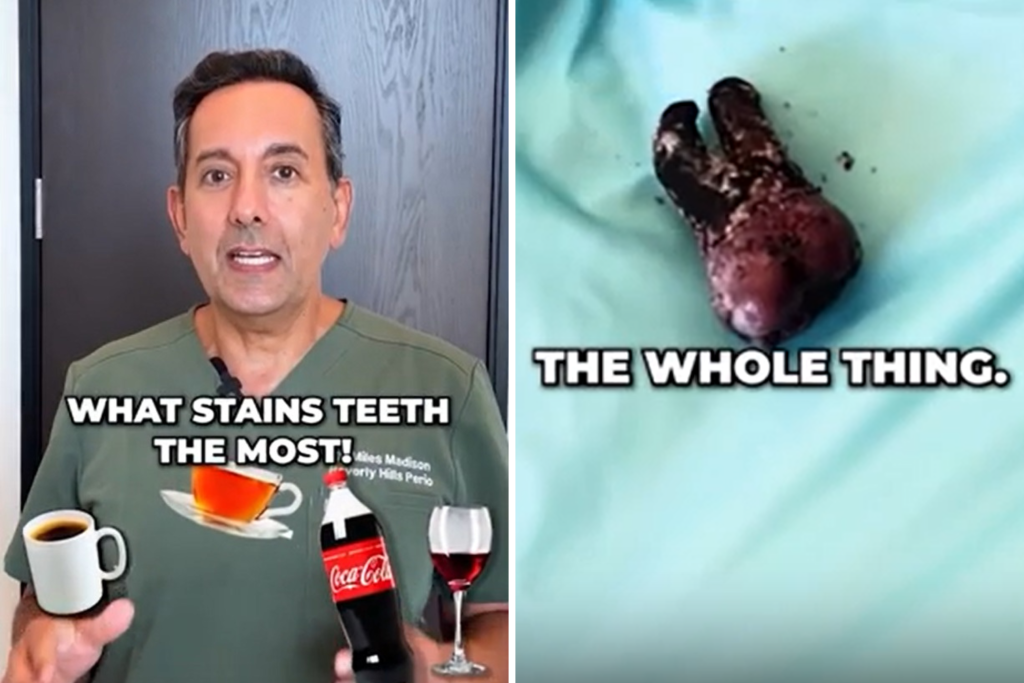The impact of popular beverages on dental health has recently captured public attention following a viral experiment conducted by Dr. Miles Madison, a Beverly Hills-based dentist. Dr. Madison, known as “the gumfather” online, immersed extracted human wisdom teeth in cola, coffee, red wine, and tea for ten days to observe their effects on tooth structure and coloration. His findings, shared on Instagram, revealed significant staining and even structural damage caused by these common drinks, sparking widespread interest and concern among viewers. While the experiment’s methodology hasn’t been independently verified, the visual results provide a compelling illustration of the potential impact of these beverages on dental aesthetics and health.
The most dramatic effect was observed with red wine, which stained the entire tooth, including the root and enamel, a deep red hue. Dr. Madison attributes this to the combined effect of the wine’s acidity and pigmentation. The acid in the wine demineralizes the tooth enamel, weakening its protective layer and allowing the dark pigments to penetrate deeply into the tooth structure. Coffee also caused noticeable darkening, particularly on the root surface, which has a lower mineral content than the enamel, making it more susceptible to staining. Tea also resulted in staining, but to a lesser degree than red wine or coffee.
Cola, however, presented the most alarming results. The tooth submerged in cola not only turned almost black but also exhibited visible pitting. This pitting is indicative of the acidic erosion of the enamel and even parts of the root structure, demonstrating the corrosive effect of the beverage on the tooth. Dr. Madison points to the acidity and dark pigments present in most colas as the culprits behind both the staining and structural damage. These observations underscore the potential consequences of frequent cola consumption on long-term dental health.
Dr. Madison’s experiment serves as a stark visual reminder of the potential impact of our dietary choices on our teeth. While the experiment utilized extracted teeth and not those within the oral environment, the results offer a simplified visualization of the potential staining and erosive processes at play. He recommends moderation in consuming these beverages, advising individuals to rinse their mouths with water immediately after consumption and to avoid sipping them for extended periods, ideally limiting consumption to 15 minutes or less. This rinsing helps to dilute the acids and pigments before they can significantly impact the teeth.
In addition to these immediate measures, Dr. Madison emphasizes the importance of regular professional dental cleanings every six months. These cleanings are essential for removing superficial stains that can, over time, penetrate deeper into the enamel, leading to more permanent discoloration. Professional cleanings also contribute to overall oral health by removing plaque and tartar buildup, which can lead to cavities and gum disease. This proactive approach to dental hygiene can help mitigate the potential long-term effects of consuming staining and acidic beverages.
The prevalence of sugary drink consumption, including sodas, sweetened fruit drinks, sports/energy drinks, and sweetened coffee/tea, is a significant public health concern. According to a CDC survey, a substantial percentage of adults report consuming these beverages daily. While Dr. Madison’s experiment focused on staining and erosion, the high sugar content of these drinks also contributes to tooth decay. Sugar fuels the growth of bacteria in the mouth, which produce acids that attack tooth enamel, leading to cavities. Combining the acidic and staining properties of these drinks with their high sugar content highlights the multifaceted risks they pose to oral health. Therefore, informed choices and mindful consumption are crucial for maintaining healthy teeth and gums. By understanding the potential effects of these beverages and adopting preventative measures, individuals can minimize the risks and maintain optimal oral health.










